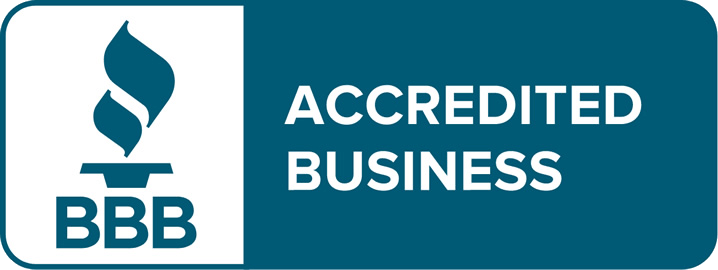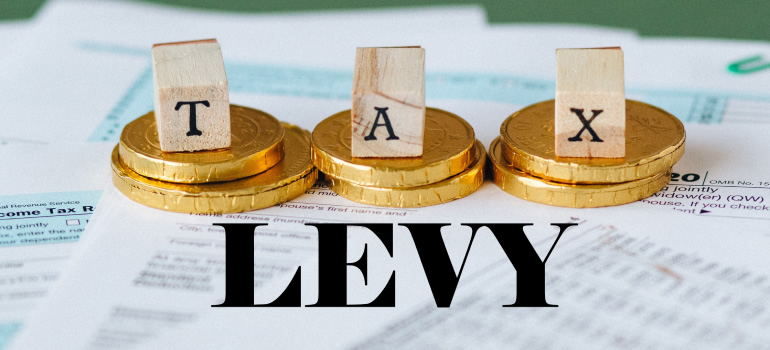Are you in the right place? If you’re looking for a comprehensive guide that will answer all of your questions about tax levies then you’re in the right place. Maybe you’re facing a tax levy or know somebody who is. Getting a tax levy can make you feel helpless. You can feel like you don’t have any say in what’s happening to your hard-earned assets and even future wages. Despite the terrible feeling that comes when getting hit with an IRS levy, the good news is you have a lot of other options that can get your life back to normal.
In this comprehensive tax levy guide gives you answers to:
What is a Tax Levy?

In its most simplified definition, the IRS says a tax levy is a legal seizure of your personal property to satisfy a tax debt. To understand what a tax levy is you first need to understand what a tax lien is.
 What’s the difference between a tax lien and a tax levy?
What’s the difference between a tax lien and a tax levy?
Why would you have a tax levy? When will the Internal Revenue Service issue a levy? A tax levy results from an unresolved tax lien. A tax lien is a legal claim on your property and other assets. The claim is “security” for the debt that you owe.
Before the lien officially starts, you will receive an official letter from the IRS asking you to pay taxes owed. If you fail to comply, the claim will begin. Failing to pay the tax lien results in the IRS initiating a tax levy. So, in simple terms, a tax lien is like a warning that if you don’t pay, a tax levy is coming. A tax levy is when the government starts seizing your property and assets to pay the tax lien.
How Does a Tax Levy Affect You?

Like all IRS procedures, a tax levy comes with plenty of warnings. If you owe taxes to the IRS, you will first get a notification in the form of a tax lien. You should receive multiple notices and demands for payments including IRS notices CP14, CP501, and CP503. If you ignore the notices you can expect IRS notice CP504 – intent to levy state tax refund or other property.
If you ignore CP504, expect a Final Notice of Intent to Levy and a Notice of Your Right to a Hearing about 30 days before the official levy is delivered via mail, in person, or at your place of employment. This levy notice describes your rights to appeal the process and gives you time to stop the levy before it goes into full motion.
After the 30 days have passed with no action on your part, the IRS can begin the levy at any time of their choosing. If you owe money to multiple sources like credit card companies, the IRS takes precedent in collecting debts owed.
 How does a tax levy affect my credit score?
How does a tax levy affect my credit score?
Getting your paycheck and finding out the IRS has beat you to it is a gut punch. However, a levy does not directly impact your credit score. If the IRS collects on a levy through wage garnishment you won’t see it on your credit report.
However, there is a long-term impact a levy can pose on your credit. For example, if the IRS garnishes your entire paycheck, it will likely affect your ability to pay other bills paid on time. Those unpaid bills will eventually show up on your credit report and can stay for up to seven years.
How Does a Tax Levy Work?

After the IRS notifies you and begins their effort of enforcing collection, the IRS has several options to choose from to collect your debt. They typically choose between, or a combination of a wage garnishment, bank levy, property seizure, and/or state tax refund offset (meaning they apply your future tax refunds to the taxes owed).

Tax Levy Wage Garnishment
Wage garnishment is a common form of a tax levy. When your wages are levied, your employer is required to hold a specified percentage of your pay and send it to the IRS to pay your tax debt. Your employer will typically have one full pay period after receiving notice of the levy before they must start complying with the IRS. The wage garnishment levy will remain in place until the debt is paid off, or another resolution has been negotiated. If it’s your first time your wages are being garnished, you are protected by the Consumer Credit Protection Act. The act prohibits employers from firing employees over first-time wage garnishments.

Bank Levies
In a bank levy scenario, the IRS will contact your bank and tell them to put a hold on your available funds. As a result, your bank account will freeze. Your bank may or may not tell you about this depending on their policies. After 21 days, the determined funds will be sent to the IRS. Some types of funds are protected from bank levies, like social security benefits and child support payments. Your bank will determine which funds can be released to the IRS.

Property Seizure
Physical property levies can include seizing assets such as your house, car, or boat. The IRS will legally seize property in order to sell it and apply the proceeds towards your debt. The sale of a property is typically posted to the public for at least 10 days before it’s sold. A notice of the sale will be provided to you. Any remaining funds after the proceeds have been applied to your debt will be refunded. A property seizure levy is the least used, and usually withheld for only the most serious situations like tax fraud.

Reduced Tax Refund
In the case that you’re due a tax refund, the IRS will deny paying you. Instead, they’ll apply the refund towards your debt. This also can apply to state refunds.
Get a free consultation
We Are Committed To Finding SolutionsLearn MoreHow Do I Stop or Prevent a Tax Levy?

Once an IRS levy goes into motion a harsh reality sets in. However, this does not mean your options for stopping it are over. In many cases, a tax levy in motion is when the real negotiations start. For example, if the tax levy puts your financial situation in a place of severe hardship it’s possible to stop the levy. The Internal Revenue Service defines severe hardship as preventing you from meeting basic and reasonable living expenses.
In addition, you always have the right to appeal a levy, which prevents it from moving forward. In these cases working with a tax resolution professional is the best strategy.
 What if I Can’t Pay My Tax Debt in Full?
What if I Can’t Pay My Tax Debt in Full?
The efficient and fastest way to unburden your life with a tax levy is to pay it fully. If you have the financial means, it’s best to pay the obligation in full and make sure your account with the IRS has a zero balance. This is not always an option, especially if you owe hundreds or thousands of dollars. Instead of risking a levy on your bank account, house, or vehicle, you may want to use one of the many other available options to get your levy released quickly.
 Appeal your tax levy
Appeal your tax levy
You will have 30 days from the time the Internal Revenue Service notifies you of its intent to levy an asset to make a formal appeal. The appeal will temporarily stop the levy from being enacted until a decision is made on your tax situation. To file a formal appeal, you must complete and submit IRS form 9423. Appealing a levy is a straightforward process. If you’re able to prove the levy will create extreme financial difficulties, an appeal can work.
 Request an installment agreement for your tax levy
Request an installment agreement for your tax levy
After the IRS begins a levy it will not stop the claim until the tax debt is paid off. Rather than wait for months or years before this happens, you can quickly get the levy released by requesting an installment agreement. An installment agreement lets you make regular monthly payments on the debt. The payments are based on your income which ensures you can afford them. This type of agreement will release any type of tax levy you’re facing.
 Make an offer in compromise
Make an offer in compromise
When you cannot realistically pay off your full tax debt, you may be able to negotiate an offer in compromise. An OIC allows you to settle your debt for less than the full total amount. Your offer should be realistic and reflect the value of your current income and assets. After your offer in compromise is accepted you will have a limited opportunity to pay it and bring your IRS account to a zero balance. After it’s paid, any levy will be released.
 Make a Case for Financial Hardship
Make a Case for Financial Hardship
When an IRS tax levy would create a severe monetary difficulty for you and your household, you can make a case for financial hardship to stop your tax levy. The IRS must leave you with enough money to pay your immediate household expense. If you’re able to show that you’re unable to do so with a levy in place the IRS may release the levy. Proving your claim will require a thorough account of financial documentation including bank statements and pay stubs.
 Prove your assets have no equity
Prove your assets have no equity
The reason the IRS uses levies is to liquidate your property to satisfy your tax debt. When your assets have no monetary value, you may prove to the IRS that they are not worth selling. If you’re able to credibly establish your assets have no equity, you may be able to get a levy against them released. To make this case you’ll need to provide bank statements showing the balances in your checking, savings, and retirement accounts. You may also need to provide appraisal statements for the assets showing their lack of value.
 Negotiate a Partial Payment Agreement
Negotiate a Partial Payment Agreement
If you’re unable to pay off what you owe with an installment agreement, you may be able to settle by asking for a partial payment agreement. A partial payment agreement is reserved for taxpayers who would experience physical or financial challenges with a regular installment agreement. The partial agreement lets you make reduced payments on your tax debt each month. It helps you avoid significant financial strain while satisfying the IRS and releasing any levies.
 File for Bankruptcy
File for Bankruptcy
As a last resort, you could file for bankruptcy to get a tax levy against your property released. Bankruptcy negatively impacts your credit report for several years. However, while your case is being filed and adjudicated, other creditors and the IRS cannot contact you about your tax debts or take any collection actions against you. Depending on the age and amount of your tax debt, you may have it consolidated into a Chapter 13 bankruptcy, allowing you to pay off your tax debts progressively each month. In rare cases, you can have the tax debt forgiven through Chapter 7 bankruptcy.
We Are Committed
To Finding
Solutions
Learn MoreWhat is a State Tax Levy?

Have you recently received a notice from the state about your tax debt? Maybe you are aware of the threat of a possible state tax levy? Let’s examine what a state tax levy is, why you may be issued one, and what you can do to take care of it.
 How state tax levies affect you
How state tax levies affect you
A state tax levy is very similar to that of an IRS levy. A state tax levy is the state’s way of forcibly seizing your assets. State tax levies can come in the form of a wage garnishment, bank account seizures, and property seizure.
Like the IRS, the state will notify you of your debt and begin a series of notices. State taxing authorities must follow a strict process of notifications before issuing a tax levy against you.
 What triggers a state tax levy? What can you do?
What triggers a state tax levy? What can you do?
State taxing authorities issue a tax levy when you owe back taxes. If you choose to become proactive prior to having a levy assessed you can avoid the headache of getting a tax state levy released.
Whether you’re facing the possibility of a state levy or trying to get one released, you need to have a firm strategy in place. It’s never too late to form a proactive strategy when facing a tax levy. Working with a tax relief expert is the fastest way to resolving a state or federal tax levy issue.
How to get help with a tax levy?

When you owe money to the IRS, it is hard to enjoy life. Being in debt is something nobody plans for, and being in debt to the IRS is especially difficult. The IRS enjoys what feels like unlimited power to collect debts.
Unlike other creditors like your mortgage lender or credit card company, the IRS has the power to take your wages, freeze your bank account, and in the worst cases imprison you. No other creditor has the same type of power and influence. Facing the IRS on your own can be intimidating, and if you’re not prepared and know what you’re doing, can end badly.
If you have received a notice from the IRS, time is not on your side. You need the right strategy to be successful and get your life back. Negotiating with the IRS requires a specific set of skills and expertise. Working with a tax resolution expert is the best way to ensure all of your options and rights are fully exercised.
Why work with a tax resolution expert?


You get peace of mind.
The IRS is a specialized agency, and you need expert advice and guidance to know you’re making the best decisions. Just being contacted by the IRS can raise your heart rate. Working with a tax resolution expert puts an experienced advocate in your corner every step of the way. After you hire a tax resolution expert you no longer need to meet or speak with the IRS, they will speak on your behalf.

You can potentially save you a lot of money.
Tax resolution agents are experts at settlements, and working with one could save you a ton of money. Taking action fast can save your home and property. When you wait too long, you could put your home, business, bank accounts, and other assets at risk. Timely professional assistance can make a world of difference.

You will feel like you’re not alone.
Fighting the IRS on your own can make you feel lonely and desperate. When you work with a tax resolution professional, you don’t have to go at it alone. They step into your shoes and take over. You can be as involved with the process as you like.

You get a chance to make things right without any shame.
Fighting the IRS on your own can make you feel lonely and desperate. When you work with a tax resolution professional, you don’t have to go at it alone. They step into your shoes and take over. You can be as involved with the process as you like.



